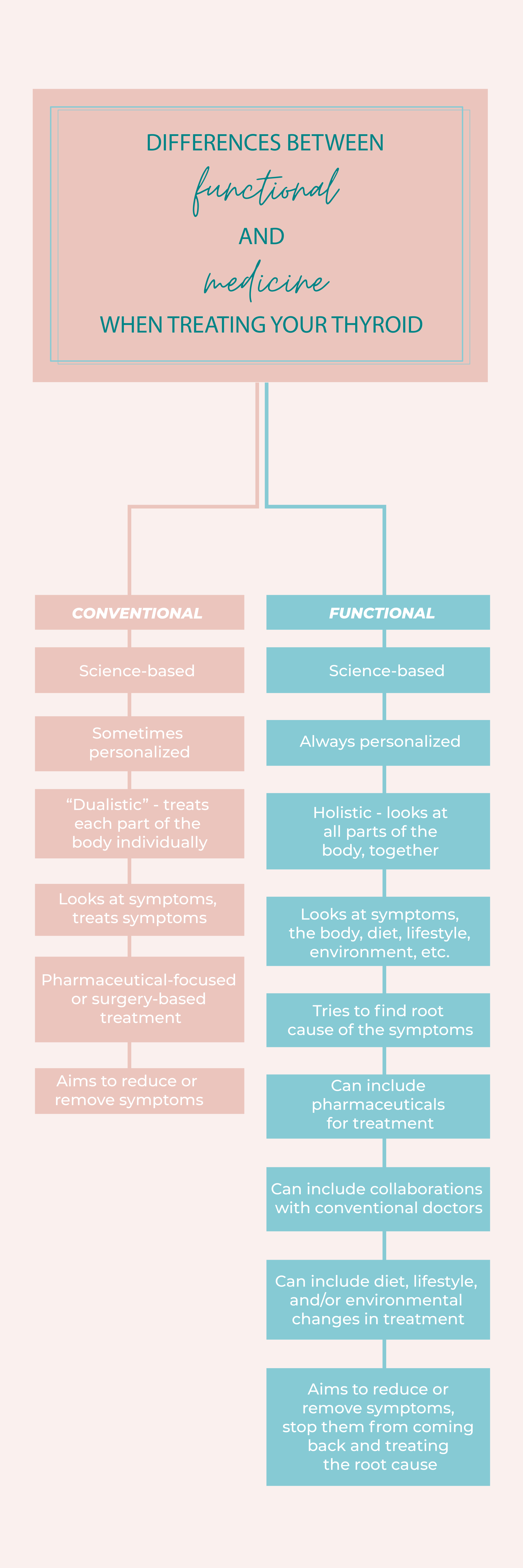READ UP ON THE LATEST THYROID NEWS!

Functional versus conventional medicine when treating your thyroid
Let me start off by saying that I am a functional health practitioner. Specifically, I am trained in Functional Diagnostic Nutrition (as well as in physical therapy, corrective high-performance exercise, and fitness nutrition, amongst other things!). Because of this, I am slightly biased towards functional medicine and functional health practices.
But! I also know there is a place for conventional medicine. As I always say, there is not one cookie-cutter approach to thyroid health (or any health, for that matter).
The purpose of this blog post is to simply help inform you, so that when you’re seeking answers and treatment, you know what to expect.
And if you don’t feel like you’re getting the answers you need, maybe this will help you look in another direction.
Conventional medicine:
In this context, “conventional” means “traditional” - the medical doctor with the white lab coat and stethoscope comes to mind. This might be your family doctor, a general practitioner at a clinic, or in the context of thyroids, an endocrinologist (hormone specialist).
Conventional medicine tends to look at the body in a “dualistic” way - meaning each system and sometimes even each organ is studied and treated individually. This is why we see so much specialization! Endocrinologists vs. gynecologists vs. bariatric specialists vs. oncologists… the list goes on.
Conventional medicine tends to focus on treating your symptoms directly, either through pharmaceuticals or in some cases, surgery. When conventional doctors see symptoms of an underactive thyroid, they will often do a T4 or a TSH panel via blood test and treat it with a lifetime daily dose of the synthetic thyroid hormone levothyroxine.
There are absolutely cases when this is the right path for a person to take in their treatment. But what else is out there?
Functional medicine:
The term “functional” started out meaning one specific type of medicine, as an alternative - ironically - to the term “alternative” medicine.
Today, though, we tend to use it in a way that means “holistic.” Functional medicine looks at the body, diet, exercise, lifestyle and environment all together. It focuses on finding the root cause of the symptoms and treating not only that root cause, but the entire person.
Functional medicine looks at all of the body’s systems and how they work together, with an understanding that a symptom in one area of the body may be a response to something somewhere completely different (for example, how the digestive system may impact your thyroid!).
Functional health can often work in collaboration with conventional practitioners, but we look for solutions beyond just medicines and surgery.
When addressing your thyroid health, functional practitioners will want to look at a full thyroid panel, complete a mineral analysis, evaluate your diet and exercise regimen, and more. A personalized treatment plan would then be developed based on those results.
Even if you are already undergoing conventional treatment, there may be a place for functional health in your healing journey.
Here’s the thing…
As I said before, some people absolutely need to be on synthetic thyroid hormones. I will never tell you to avoid your doctor’s recommendations or come off of a prescription medication on your own.
BUT,
You have a right to autonomy over your health! I think it’s a good idea for everyone to know what options are out there and find what’s best for YOU.
Check out the infographic below for more information. If you want to connect and start understanding some functional health options for addressing your hypothyroidism, give me a shout.


Functional versus conventional medicine when treating your thyroid
Let me start off by saying that I am a functional health practitioner. Specifically, I am trained in Functional Diagnostic Nutrition (as well as in physical therapy, corrective high-performance exercise, and fitness nutrition, amongst other things!). Because of this, I am slightly biased towards functional medicine and functional health practices.
But! I also know there is a place for conventional medicine. As I always say, there is not one cookie-cutter approach to thyroid health (or any health, for that matter).
The purpose of this blog post is to simply help inform you, so that when you’re seeking answers and treatment, you know what to expect.
And if you don’t feel like you’re getting the answers you need, maybe this will help you look in another direction.
Conventional medicine:
In this context, “conventional” means “traditional” - the medical doctor with the white lab coat and stethoscope comes to mind. This might be your family doctor, a general practitioner at a clinic, or in the context of thyroids, an endocrinologist (hormone specialist).
Conventional medicine tends to look at the body in a “dualistic” way - meaning each system and sometimes even each organ is studied and treated individually. This is why we see so much specialization! Endocrinologists vs. gynecologists vs. bariatric specialists vs. oncologists… the list goes on.
Conventional medicine tends to focus on treating your symptoms directly, either through pharmaceuticals or in some cases, surgery. When conventional doctors see symptoms of an underactive thyroid, they will often do a T4 or a TSH panel via blood test and treat it with a lifetime daily dose of the synthetic thyroid hormone levothyroxine.
There are absolutely cases when this is the right path for a person to take in their treatment. But what else is out there?
Functional medicine:
The term “functional” started out meaning one specific type of medicine, as an alternative - ironically - to the term “alternative” medicine.
Today, though, we tend to use it in a way that means “holistic.” Functional medicine looks at the body, diet, exercise, lifestyle and environment all together. It focuses on finding the root cause of the symptoms and treating not only that root cause, but the entire person.
Functional medicine looks at all of the body’s systems and how they work together, with an understanding that a symptom in one area of the body may be a response to something somewhere completely different (for example, how the digestive system may impact your thyroid!).
Functional health can often work in collaboration with conventional practitioners, but we look for solutions beyond just medicines and surgery.
When addressing your thyroid health, functional practitioners will want to look at a full thyroid panel, complete a mineral analysis, evaluate your diet and exercise regimen, and more. A personalized treatment plan would then be developed based on those results.
Even if you are already undergoing conventional treatment, there may be a place for functional health in your healing journey.
Here’s the thing…
As I said before, some people absolutely need to be on synthetic thyroid hormones. I will never tell you to avoid your doctor’s recommendations or come off of a prescription medication on your own.
BUT,
You have a right to autonomy over your health! I think it’s a good idea for everyone to know what options are out there and find what’s best for YOU.
Check out the infographic below for more information. If you want to connect and start understanding some functional health options for addressing your hypothyroidism, give me a shout.


CALL US TODAY! (314) 226-3137
Content, including images, displayed on this website is protected by copyright laws. Downloading, republication, retransmission or reproduction of content on this website.
